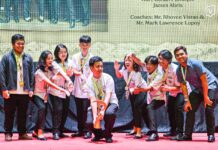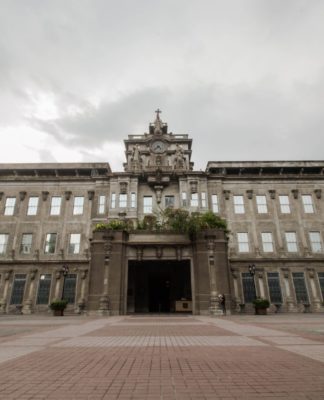 UNABLE to take formal education in his childhood days, Tirso Sumawang once marveled at the sight of other people able to write their names, compute their ages, or even read jeepney signboards.
UNABLE to take formal education in his childhood days, Tirso Sumawang once marveled at the sight of other people able to write their names, compute their ages, or even read jeepney signboards.
“I remember an instance when I got lost in San Fernando in Pampanga because I could not read the jeepney signboard. The man I asked whether that jeepney is going to Dapdap or to Capas (Tarlac) made me ride the jeepney going to San Fernando,” Sumawang recalled in Filipino.
Four years ago, Sumawang, 32, had the opportunity to learn to read and write because of UST’s innovative distance learning program which held classes among Aetas via two-way radio.
Last April 8, Sumawang, together with 59 fellow Aetas from Bamban, Tarlac, flocked to the Albertus Magnus Auditorium to receive their certificates of recognition after completing a four-year modular course under the UST Distance Education Program.
The program, started by former Student Affairs head and now Alumni Affairs Director Evelyn Songco back in 1999, was administered by “para-teachers” under the supervision of College of Education Assistant Professor Marielyn Quintana and Faculty of Arts and Letters Assistant Professor Arlene Domingo.
“I am very happy for the Aeta adult learners. Each of them had been very eager to learn new things and to accept changes,” Lucy Guya, one of the para-teachers, told the Varsitarian.
After the Mt. Pinatubo eruption in 1991, most of the Aeta communities found refuge in the highlands of Zambales and Tarlac. Five sitios in Bamban, Tarlac – Mabilog, Malasa, Haduan, San Martin, and Santa Rosa – are now partner communities of UST, where non-formal classes via two-way radio are conducted.
Aside from topics on environmental conservation, livelihood, health, responsible parenthood, and community development, lessons in the modules are practically linked to the Aetas’ everyday survival, like learning how to read and understand legal documents such as those pertaining to their ancestral domain, being aware of the value of their crops, and even how to write a letter.
“I am happy because after many years, the UST Distance Education Program is able to fulfill its intention to build a community with people believing in themselves, a self-help community,” acting Rector Fr. Rolando V. dela Rosa, O.P. said.
The awards given to the Aeta learners were Gawad Husay sa Tula at Sanaysay, Gawad Husay sa Pagguhit, Gawad Sipag sa Pagpasok, Gawad Sigasig sa Pagkatuto, and Gawad Tiwala sa Sarili. A.M.P. Dagcutan

















